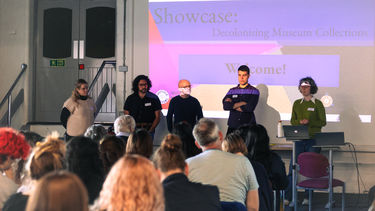Showcase: Decolonising Museum Collections, demonstrated the power of collaboration as PhD students at the universities of Sheffield, Leeds and York worked with Sheffield Museums to host the highly successful event. With a range of talks and workshops, the day focussed on how we understand complicated histories of the British Empire, and how museum collections might untangle and display these relationships. The event was funded by White Rose College of the Arts & Humanities (WRoCAH).
History PhD student Tobias Gardener, whose research aims to uncover the links between the inland industrial city of Sheffield and the global system of Atlantic slavery, led from the University of Sheffield. He said:
“I thoroughly enjoyed helping to organise this unique event. Sheffield museums enabled us to create a lively and friendly space to discuss the issues surrounding the concept of decolonisation, which I hope has fostered some important connections between fellow academics and museum professionals, as well members of the public. I was genuinely really pleased to see the interest people had in Sheffield’s historical role in this topic, given it is often lost in national conversations about British imperialism, and of course has been a central theme of my PhD research.”
Indigo Gray, English PhD researcher, co-organised and opened the day with a talk on The Seven Colonial Themes of Kelham Island Museum, outlining the colonial themes present in the museum's collection. Indigo reflected on the event:
“It was a pleasure to work with Sheffield Museums and to share my thoughts on decolonising industrial museum collections, which came out of some research I did for Kelham Island Museum earlier in the year. We were keen to reach out to the public and take the work beyond strictly academic circles, and this fostered really interesting conversations amongst our audience and speakers. We’ve received some lovely feedback and it sounds like the event felt valuable to attendees who don’t always see themselves represented in the museum.”
The event was completely sold out and saw attendees from across the north.

